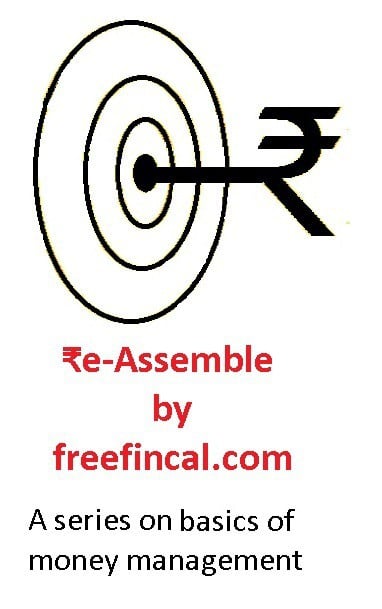Last Updated on September 27, 2023 at 5:26 pm
This week in ₹e-assemble, we shall discuss how to track monthly expenses and manage them efficiently. ₹e-assemble is a series on the basics of money management aimed at young earners. If you ask me now, “how should I track expenses?”, I would say, “do not track, instead invest first and spend later”. However, I am jumping the gun. I need to put myself in the shoes of a young earner and discuss the issue of expense tracking and management.
₹e-Assemble: a recap of the steps
Many of you may be on vacation this month or in the last week of Dec. Now would be a perfect time to work on these steps.
 Step 1: Listing your goals dreams and nightmares
Step 1: Listing your goals dreams and nightmares
Step 2: Lay the Foundations to Get Rich creating an emergency fund
Join 32,000+ readers and get free money management solutions delivered to your inbox! Subscribe to get posts via email! (Link takes you to our email sign-up form)
🔥Want to create a complete financial plan? Learn goal-based investing? Exclusive access to our DIY tools? Increase your income with your skills? Enjoy massive discounts on our robo-advisory tool & courses! 🔥
Step 3: How to buy Term Life Insurance
Step 4: How to choose a suitable health insurance policy
* Apollo Munich Optima Restore Benefit vs Max Bupa Re-fill Benefit
* Star Health Comprehensive Insurance vs Religare Care Comprehensive Insurance
* Shall continue comparing policies.
Step 5: How to select a credit card for maximum benefit
Step 6: This post: tracking and managing expenses.
Step 7: Coming soon: choosing and managing debt/loans
Step 8: Coming soon: choosing accident insurance
Step 9,10 etc. : Coming soon: Starting investing and portfolio management with examples from readers.
Why should we track monthly expenses?
Ask this question and you will get responses like: “it is good to know our spending patterns and analyze them”. Excuse me, but this makes no sense at all. If I am eating out four times a month, do I need to track restaurant bills or enter them in a mobile to app to understand that I am spending a good amount of money dining outside? Can’t we recall from memory that a good chunk of our salary goes “there”?
Why do you need to track expenses to know your spending patterns? You are the one who spent the money. It is that hard to remember? If it is, you have a spending problem and tracking will not help.
My point is, when it comes to managing expenses, recording an expense after it has occurred has little value. We need to track expenses by budgeting and not track expenses by spending or staring at fancy pie charts. Understanding this difference is crucial to expense management.
How to track monthly expenses using the envelope system
There is a lot we need to learn from our parents. My mom and dad maintained an accounts notebook – several of them. So did my grandfather and my great-grandfather. Each month they did not record expenses in the notebook but accounted for them before the expenditure. That is, they budgeted for each expense using what is known as the envelope system.
Each month, dad would bring his accounts notebook and mom an array of dabbas. Dad would first copy the entries from last month onto a new page with the current month and year as the title. Then he would read out each entry. Mom would take out an amount and put it in a labelled dabba. The first entry was always “temple”. She would put Rs. 1/20/50/100 in a dabba meant to be transferred at an appropriate time to a temple Hundi. Next came milk – Rs. 300 went to a box named milk. Rs. 1000 went to a box name groceries (provisions, cosmetics etc.), Rs. 500 went to a vegetable box, etc. you get the picture. These numbers are from a couple of decades ago.
This is known as the envelope system because at the start of the month we allocate a sum to each envelope/dabba for a specific expenditure. The idea is to not overshoot it as much as possible. My parents has an “extras” or “miscellaneous” dabba. This was a mini-emergency reserve for the month. If dal prices shot up or vegetables become more expensive, they would take some money from the extras dabba to handle the shortfall. They also had a leisure/pleasure dabba. This was for going to the cinema, buying me toys or books etc.
If there was a shortfall in the needs dabbas – milk, groceries, petrol etc. – they would use funds from extras. If there was a shortfall in the wants/leisure dabba, we just had to wait until next month. I am not making this up! This is how my parents handled family expenses for 31 years until my father fell sick with cancer. Then I and my wife took over. We continued to use the same dabbas but a few years, I started using a spreadsheet/graphing software for this (not excel). I still use that software and still have the file. Once I started goal-based investing, the envelope process became redundant and we no longer track any expenses now, only investments. That story is here: How tracking investments instead of expenses changed my life! This post also has a template of the tracker that I now use.
In the context of the post, look us consider the simple beauty of the envelope system. Notice you are not tracking expenses before the spending. Both needs and wants are budgeted into specific bins with a spares bin. If the needs bins are exhausted we can borrow from the spares bin. If the wants bin becomes empty, we sit it out. This obviously requires discipline, but so does everything else in life. The spending becomes organized from day one with no further need to track it after each spend.
There were times when mom and dad had to consistently borrow from the extras/spares dabba. For eg. due to temporary/permanent inflation, the amount they would usually allocate to the vegetable dabba was insufficient. After 2-3 months, they would allocate more the vegetable dabba.
Now consider the value of this information recorded over years. I can pick December and find out how the allocation to “vegetables” has increased over the years. Then I can calculate the average rate of year on year increase. This is known as inflation.
For example, allocation to vegetable in
Dec. 2015: 2000
Dec. 2017: 2500
Then 2500 = 2000 x (1+ inflation) x (1+ inflation) —> multiplied twice for 2 years elapsed
or 2500 = 2000 x (1 + inflaion)^2 —> ^ stands for “to the power of”
or inflation = (2500/200)^(1/2) -1 = 12%.
This is how I was able to write this post: Inflation in India: Some Real Numbers. Here is an image from the post.

I would strongly recommend that you use this simple Personal Inflation Calculator to understand the overall rate of increase in your expenses. It will help you become a better investor.
What are the benefits of using the envelop system to track monthly expenses
1: A system cannot make you disciplined. That is up to you. For those who can be disciplined, the envelope system gives a fantastic sense of purpose.
2: By binning expenses, we immediately know our limits and there is no need to track expenditure.
3: It ratifies expenditure for leisure but within limits (which you get to set!)
4: If you manage to not breach the limits of leisure spending and can wait for the next month, you develop a sense of delay gratification.
5: It makes you aware of inflation in a simple and direct manner.
I believe this system is superior to one in which spending patterns are analysed after the expenditure.
How to track monthly expenses: digital or non-digital means?
Whatever works for you, BUT if you are married or have a live-in partner and can stomach sitting 15 minutes together with that person, do it together. It is essential to manage and track expenses together and be completely honest about our spending.
What does tracking monthly expenses “efficiently” mean?
Whatever method you adopt, it should make you spend in a controlled manner. Wild swings in expenditure should be reduced.
your personal rate of inflation is the most important output of expense tracking. This will help you choose suitable investment products.
So what is the system you follow to manage expenses?
Do check out my books
 | You Can Be Rich Too with Goal-Based Investing, my first book is now available at a 35% discount for Rs. 258. It comes with nine online calculators. Get it now. |
 | Gamechanger, my second book is now only Rs 149 (25% off). Get it or gift it to a young earner |
 | The ultimate guide to travel by Pranav Surya is a deep dive analysis into vacation planning, finding cheap flights, budget accommodation, what to do when travelling, how travelling slowly is better financially and psychologically with links to the web pages and hand-holding at every step. Get the pdf for ₹199 (instant download) |
Use this form to ask Questions or reg. the robo template ONLY (For comments/opinions, use the form at the bottom)
And I will respond to them in the next few days. I welcome tough questions. Please do not ask for investment advice. Before asking, please search the site if the issue has already been discussed. Thank you. PLEASE DO NOT POST COMMENTS WITH THIS FORM it is for questions only.
🔥Enjoy massive discounts on our courses, robo-advisory tool and exclusive investor circle! 🔥& join our community of 7000+ users!
Use our Robo-advisory Tool for a start-to-finish financial plan! ⇐ More than 2,500 investors and advisors use this!
Track your mutual funds and stock investments with this Google Sheet!
We also publish monthly equity mutual funds, debt and hybrid mutual funds, index funds and ETF screeners and momentum, low-volatility stock screeners.





- Do you have a comment about the above article? Reach out to us on Twitter: @freefincal or @pattufreefincal
- Have a question? Subscribe to our newsletter using the form below.
- Hit 'reply' to any email from us! We do not offer personalized investment advice. We can write a detailed article without mentioning your name if you have a generic question.
Join 32,000+ readers and get free money management solutions delivered to your inbox! Subscribe to get posts via email! (Link takes you to our email sign-up form)
About The Author
 Dr M. Pattabiraman(PhD) is the founder, managing editor and primary author of freefincal. He is an associate professor at the Indian Institute of Technology, Madras. He has over ten years of experience publishing news analysis, research and financial product development. Connect with him via Twitter(X), Linkedin, or YouTube. Pattabiraman has co-authored three print books: (1) You can be rich too with goal-based investing (CNBC TV18) for DIY investors. (2) Gamechanger for young earners. (3) Chinchu Gets a Superpower! for kids. He has also written seven other free e-books on various money management topics. He is a patron and co-founder of “Fee-only India,” an organisation promoting unbiased, commission-free investment advice.
Dr M. Pattabiraman(PhD) is the founder, managing editor and primary author of freefincal. He is an associate professor at the Indian Institute of Technology, Madras. He has over ten years of experience publishing news analysis, research and financial product development. Connect with him via Twitter(X), Linkedin, or YouTube. Pattabiraman has co-authored three print books: (1) You can be rich too with goal-based investing (CNBC TV18) for DIY investors. (2) Gamechanger for young earners. (3) Chinchu Gets a Superpower! for kids. He has also written seven other free e-books on various money management topics. He is a patron and co-founder of “Fee-only India,” an organisation promoting unbiased, commission-free investment advice.Our flagship course! Learn to manage your portfolio like a pro to achieve your goals regardless of market conditions! ⇐ More than 3,000 investors and advisors are part of our exclusive community! Get clarity on how to plan for your goals and achieve the necessary corpus no matter the market condition is!! Watch the first lecture for free! One-time payment! No recurring fees! Life-long access to videos! Reduce fear, uncertainty and doubt while investing! Learn how to plan for your goals before and after retirement with confidence.
Our new course! Increase your income by getting people to pay for your skills! ⇐ More than 700 salaried employees, entrepreneurs and financial advisors are part of our exclusive community! Learn how to get people to pay for your skills! Whether you are a professional or small business owner who wants more clients via online visibility or a salaried person wanting a side income or passive income, we will show you how to achieve this by showcasing your skills and building a community that trusts and pays you! (watch 1st lecture for free). One-time payment! No recurring fees! Life-long access to videos!
Our new book for kids: “Chinchu Gets a Superpower!” is now available!


Must-read book even for adults! This is something that every parent should teach their kids right from their young age. The importance of money management and decision making based on their wants and needs. Very nicely written in simple terms. - Arun.Buy the book: Chinchu gets a superpower for your child!
How to profit from content writing: Our new ebook is for those interested in getting side income via content writing. It is available at a 50% discount for Rs. 500 only!
Do you want to check if the market is overvalued or undervalued? Use our market valuation tool (it will work with any index!), or get the Tactical Buy/Sell timing tool!
We publish monthly mutual fund screeners and momentum, low-volatility stock screeners.
About freefincal & its content policy. Freefincal is a News Media Organization dedicated to providing original analysis, reports, reviews and insights on mutual funds, stocks, investing, retirement and personal finance developments. We do so without conflict of interest and bias. Follow us on Google News. Freefincal serves more than three million readers a year (5 million page views) with articles based only on factual information and detailed analysis by its authors. All statements made will be verified with credible and knowledgeable sources before publication. Freefincal does not publish paid articles, promotions, PR, satire or opinions without data. All opinions will be inferences backed by verifiable, reproducible evidence/data. Contact information: To get in touch, use this contact form. (Sponsored posts or paid collaborations will not be entertained.)
Connect with us on social media
- Twitter @freefincal
- Subscribe to our YouTube Videos
- Posts feed via Feedburner.
Our publications
You Can Be Rich Too with Goal-Based Investing
 Published by CNBC TV18, this book is meant to help you ask the right questions and seek the correct answers, and since it comes with nine online calculators, you can also create custom solutions for your lifestyle! Get it now.
Published by CNBC TV18, this book is meant to help you ask the right questions and seek the correct answers, and since it comes with nine online calculators, you can also create custom solutions for your lifestyle! Get it now.Gamechanger: Forget Startups, Join Corporate & Still Live the Rich Life You Want
 This book is meant for young earners to get their basics right from day one! It will also help you travel to exotic places at a low cost! Get it or gift it to a young earner.
This book is meant for young earners to get their basics right from day one! It will also help you travel to exotic places at a low cost! Get it or gift it to a young earner.Your Ultimate Guide to Travel
 This is an in-depth dive into vacation planning, finding cheap flights, budget accommodation, what to do when travelling, and how travelling slowly is better financially and psychologically, with links to the web pages and hand-holding at every step. Get the pdf for Rs 300 (instant download)
This is an in-depth dive into vacation planning, finding cheap flights, budget accommodation, what to do when travelling, and how travelling slowly is better financially and psychologically, with links to the web pages and hand-holding at every step. Get the pdf for Rs 300 (instant download)